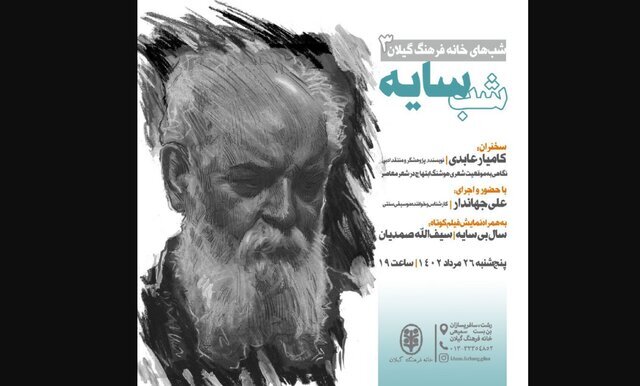Meeting to pay tribute to Hushang Ebtehaj on his first death anniversary

TEHRAN – On the occasion of the first anniversary of Hushang Ebtehaj’s passing, a meeting will be held in his birthplace, Rasht, on Thursday.
In the session entitled “Sayeh Night”, writer and researcher Kamyar Abedi will deliver a speech on "A Look at Hushang Ebtehaj's Situation in Contemporary Poetry" and expert and performer of traditional music Ali Jahandar will talk about Hushang Ebtehaj's place in Iranian traditional music while performing several compositions.
Furthermore, the short film, "A Year without Sayeh" by Iranian documentarian Seifollah Samadian, will be shown at the event.
Last year, Ebtehaj, who wrote under the pseudonym of “Sayeh”, died from complications related to old age in his home in Cologne, Germany. He was 94.
Iranian literati consider him the last summit of the few top poets of contemporary Persian literature. He composed in ghazal, the most important Persian lyrical form influenced by the classical Persian tradition. He also produced collections in blank verse, for which poet Nima Yushij is known.
Born in the northern Iranian city of Rasht, Ebtehaj received his primary and high school education in his hometown. Besides pursuing his interest in literature, Ebtehaj also tried his hand at painting, sculpture, music and tailoring, yet only poetry remained his favorite.
He created his debut collection, “Early Songs”, when he was at 19. However, he was not satisfied with the collection, which failed to bring him fame as well.
The collection was followed by “Mirage”, “Siah Mashq” and several other books, including “Mirror in the Mirror” and “Hafez by Sayeh’s Exertion”, which presented Ebtehaj as a poet that Persian literature had to take seriously.
In his youth, Ebtehaj joined the communist Tudeh Party, although his ideal was human freedom.
In 1971, his love of poetry and music drew him to Tehran Radio, where he was selected as the director of Golha, a professional program of traditional Persian music. With contributions from vocalist Mohammadreza Shajarian and top musicians such as Mohammadreza Lotfi, Parviz Meshkatian and Hossein Alizadeh, he recorded numerous albums, which are considered a great treasure of Iranian music.
In protest of the killing of peaceful demonstrators in Tehran’s Jaleh Square in September 1978 by the Shah’s military, Ebtehaj and musicians terminated their collaboration with Golha.
However, they teamed up to produce some protest songs, which then turned out to become the anthems chanted by the revolutionaries.
“Sepideh” (“Dawn”) was one of the songs composed by Lotfi with a poem by Ebtehaj. The song is also known as “O Iran, the House of Hope”.
“Hafez by Sayeh’s Exertion” represents one of the best editions of the Divan of Hafez corrected by Sayeh in 1993.
ABU/
